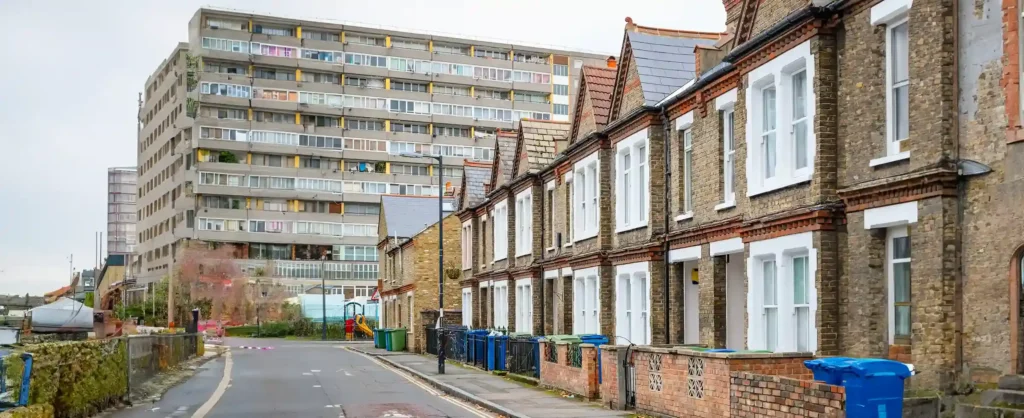UPDATE
Since this article’s publication, the Renters Reform Bill has been put on indefinite hold in parliament. As of 19th August 2024, it is stuck in its second reading in the House of Lords. Earlier this year, industry experts and political insiders speculated that the bill is unlikely to pass. This is due to resistance from Conservative MPs who wish to strengthen its protections for landlords in the face of multiple protections for tenants. With the new Labour government in place, future housebuilding plans could lead to a renewed interest in passing the Renters Reform Bill in its current state. For now, the bill’s status, and its potential impact on the private rented sector, is uncertain.
ARTICLE
Renters and landlords alike have been struggling to stay afloat in recent years with house prices and rental costs significantly changing due to the ongoing housing, cost of living and mortgage crises, many have found themselves priced out of an increasingly unstable housing market.
The Renters Reform Bill is a potential solution to the perceived unfairness and lack of oversight in the private rented sector. Introduced to parliament earlier this year, the bill has received no shortage of attention from both the media and concerned private rented stakeholders.
Though we previously explored how the bill (and any speculation surrounding it) could impact the housing market, the specific terms of the bill are more complex.
Are you concerned about the Renters Reform Bill? Are you still trying to understand what it could mean for your owned properties, tenancy agreements or general well-being?
Team CCG is here to help with a simple breakdown of exactly what the bill aims to do.
Why Did They Draft a Renters Reform Bill?
The Renters Reform Bill was first proposed in April 2019 as part of a plan by former prime minister Theresa May to put an end to Section 21 evictions, otherwise known as ‘no-fault evictions’. These evictions previously allowed landlords to remove tenants from their properties without needing to establish any legal cause.
In the four years since the Renters Reform Bill has evolved to encompass a wider range of housing law changes intended to create a fairer private rented sector.
The government’s argument, as outlined in their ‘A fairer private rented sector’ whitepaper, is that Assured Shorthold Tenancies (ASTs) fail to provide security to tenants with adequate security and housing quality, increasing the likelihood of homelessness and diminishing the responsibility of landlords to their tenants.
The lack of any firm legal requirements or legislation for private landlords to accommodate their tenants beyond necessities also means that local authorities are unable to properly tackle poor property management.
The Renters Reform Bill will not only seek to address lapses and shortcomings in tenant rights but also encourage trust in high-quality, responsible landlords and discourage ‘slumlords’.
When Will the Renters Reform Bill Pass?
After years of being written, rewritten, debated and passed around, the Renters Reform Bill was introduced to Parliament in May 2023. Now, as it progresses through parliament, the bill will have a maximum term of just under 18 months before 2024’s general election.
Despite this 18-month deadline, there is no set timeframe for a bill to be put into practice. There is also a chance of alteration of the bill’s terms before it passes through parliament.
What Would the Renters Reform Bill Change?
As of August 2023, the Bill will introduce the following changes to the private rented sector:
- Abolishing ASTs and no-fault evictions
- Introducing monthly periodic tenancies with no specified end date
- Amending legislation for landlord property repossessions to make it easier for landlords to evict antisocial and non-paying tenants
- Introducing a process for implementing rent increases, with landlords needing to justify market-driven rent increases to a tribunal
- Establishing a private rented sector Ombudsman for settling renter disputes
- Establishing an online Property Portal for landlords, renters and local councils
- Requiring landlords to purchase pet insurance and consider tenants’ pet ownership requests
Concerns from Landlords
Landlords have naturally become concerned that the Renters Reform Bill will introduce a host of obstacles to the private rented sector during an already challenging and turbulent period.
With the rental crisis being prompted largely by the cost of living and interest increases, some are concerned that further meddling will have the adverse effect of pushing existing landlords from the private rented sector. This would reduce the nation’s supply of rental properties.
Earlier this year, renters found themselves on the receiving end of record rent hikes due to surging mortgage costs and landlords attempting to offset their financial impact. With Zoopla reporting a 10% rise in private rented home demand since 2022, any further shifts to the current supply of buy-to-let homes could put renters at more of a disadvantage.
Concerns from Tenants
For tenants, the Renters Reform Bill may seem like a necessary breath of fresh air. Still, many tenant organisations are concerned that the new processes introduced to give landlords the right to repossess their properties could wind up becoming no-fault evictions under a different name.
Homelessness charity Shelter, for instance, released an immediate response to the Renters Reform Bill claiming that its terms would not sufficiently protect private renters. Their suggestions for a more ambitious bill involve:
- Closing loopholes for unfair evictions following Section 21 eviction ban
- Extending notice, protection and ‘no reletting’ periods
- Preserving the rights of private renters to access homelessness assistance from local councils
- Bringing forward rapid legislation to outlaw needs-based rental discrimination
There are also aspects of the ‘A fairer private rented sector’ whitepaper not present in the bill, including:
- Outlawing blanket bans on renting to tenants on benefits or households with children
- Strengthening the power of local councils and requiring them to report on enforcement
- Applying a Decent Homes Standard for the private rented sector
Some worry that the bill may be too late to significantly impact the already dire state of the private rented sector for the average renter. Recent record homelessness is a prime example of the worsening state of housing affordability.
What Concept Capital Group Does Differently
At Concept Capital Group, we specialise in mortgage-free modular property investments for landlords who want to embrace a high-growth alternative to the traditional housing market.
With a single upfront payment starting from £42,999, you could own a fully-managed modular unit that we build, place and fill with a pre-approved tenant from a list of over 800 candidates. The efficiency we have built into our service means you will receive your first rental payment within 90 days of purchase and enjoy a consistent 10% annual yield on your investment with no void periods, no maintenance costs and no hidden fees.
Want to start your investment journey? You can book a call with our team today.













